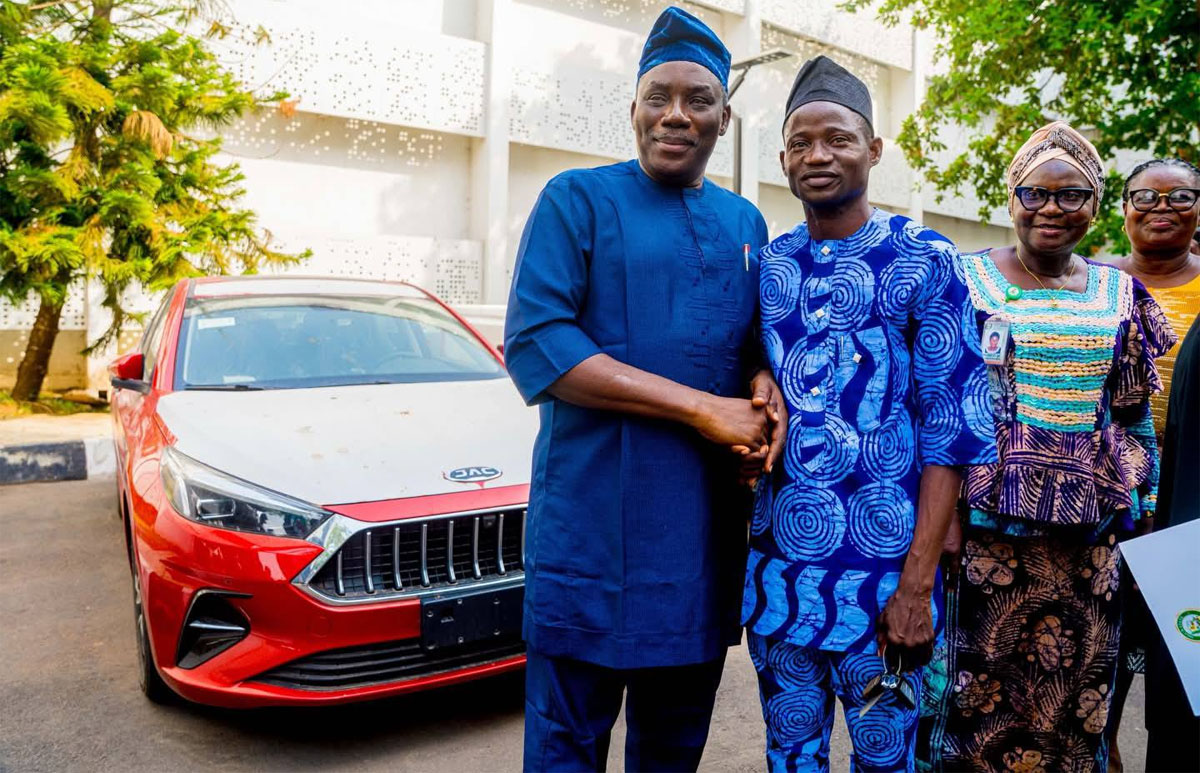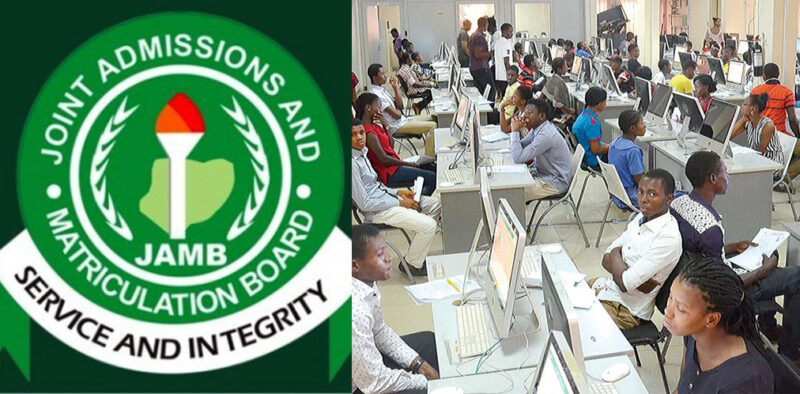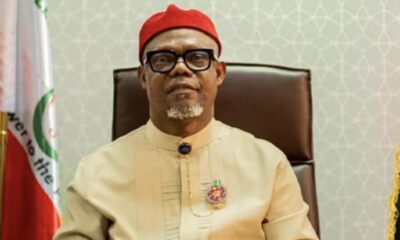Education
Meet Eruani, youngest Nigerian to receive CFR national honours

President Muhammadu Buhari is set to confer a national honour award of the Commander of the Order of the Federal Republic on a 48-year-old medical doctor, industrialist and celebrated entrepreneur, Dr Eruani Azibapu, becoming the youngest Nigerian to receive the CFR award.
Eruani, who is the chief executive officer of Azikel Refinery, is to get the award for his immense contributions to Nigeria’s economic growth, employment and national development, according to the letter conveying the national award to him.
The CFR award, according to the letter, will be formally conferred on him at a ceremony scheduled for Tuesday, October 11, 2022, at the International Conference Centre, Abuja.
Born on December 25, 1973 to the royal family of King Allwell Eruani, Aguda IX, the Obenema of Emadike Kingdom in Bayelsa State, the philanthropist obtained his Bachelor of Medicine and Bachelor of Surgery (MBBS) from the University of Port Harcourt in 1999.
In preparation for business conquest, he studied at the Lagos Business School where he obtained certification in the Owner Management Programme (OMP). He also studied at the London Business School and the University of Pennsylvania and obtained the Senior Executive Programme (SEP) and Advance Management Programme (AMP) certifications respectively.
Eruani pioneered the establishment of in-country petroleum refining by setting up the first private Hydroskimming Refinery in Nigeria.
With an output of 25,000 barrels per day, Azikel Refinery brings to reality President Buhari’s Modular Refinery Regime launched in 2015.
His business interests, which started with dredging and sandfilling, include power, aviation, oil and gas and technology.
On graduation, he worked as a medical officer in the civil service and some private clinics in Port Harcourt, and later sought further education and specialisation, starting in surgery at the University of Port Harcourt Teaching Hospital, then travelled to the United States (US) and took interest in family medicine and later became a member of the American Academy of Family Physicians.
Azibapu also worked in Bayelsa State as a medical officer. But when he became a member of the American Academy of Family Physicians, he secured employment in Nigerian Agip Oil Company as an expatriate, basically providing occupational health services. He rose to the level of a deputy chief industrial doctor.
Then, there was clamour for him to come back, as the government of Bayelsa State needed some experienced doctors to revive its health sector.
The then governor, and later President, Dr. Goodluck Jonathan, appointed him as adviser on HIV/AIDS and Community Health and he was appointed commissioner of Health by Chief Timipre Sylvia, who took over from Jonathan.
After serving as adviser for about two years and commissioner for about five years, he went into an area that was considered not befitting, the business of sand selling.
At the outset, not many people wanted to work with him. In fact, when he told his mother that he wanted to go into selling sand, she wept, that her son and only child, a medical doctor of international repute and commissioner was going to start selling sand.
But Azibapu had always known that one could actually make a good business from what many people didn’t like. And he found encouragement in his father, who said he believed in whatever he wanted to do.

He said, “I looked at the critical drivers of that business – I needed to have land and a dredging machine. I couldn’t afford to buy a dredging machine, because it costs millions of dollars. The cheapest dredging machine as at that time was nothing less than $10 million.
“I needed to get land by the riverside. I could go to a community to get land and even if I cannot pay at once, I can pay overtime, and that was what I did. I went and discussed with the Otuogori community and they agreed. That is where my operation is based, more so, it was a vacant land then, as it was always submerged under water.”
Solving the problem of dredging machine was more challenging, as he didn’t have the money to rent a dredging machine, let alone buy one. “So, I approached someone I know has a dredging machine, who remains very famous in my history, called Akpe. I asked if he could pump some sand for me, and he agreed to do so if I was willing to pay.
“From the bill he gave me, I needed an initial deposit of about N80million. I didn’t even have up to N10million. I tried to bargain as much as I could, but it wasn’t forthcoming, so I accepted it, despite not having the money.
“But I said since he wouldn’t need the whole N80 million at once, we should have a payment plan and I proposed N80 million to dredge about 100 feet of sand and offered to pay him N5 million deposit to mobilise a dredging machine to the site.
“I was able to muster about N10 million, so while he was there, I could pay him another N5 million. So, when he pumped the sand and we quantified that it was worth N10 million, I paid another N10 million,” he recalled.”
Asked how he hit it at an early age, Azibapu explained: “It is influence, largely environmental influence. The environment is not where you grow up; it is the people that you meet, your perception and the people that are around you. When you are purposeful and you have success written around you, you are likely to succeed.”
Today, Azikel operates in Bayelsa, Delta and Rivers states. The business soon evolved into a multinational industry and there was the quest to diversify, this time into the aviation sector, starting with a small aircraft.

Other prominent Nigerians to receive the CFR national award are the Speaker of the House of Representatives, Rt. Hon. Femi Gbajaiamila; his predecessor, Rt. Hon. Yakubu Dogara; Deputy President of the Senate, Senator Ovie Omo-Agege; Secretary to the Government of the Federation, Mr Boss Mustapha; Head of Service of the Federation, Dr. Folashade Yemi-Esan; former President of the Court of Appeal, Justice Ayo Salami (retired); former CEO/Managing Director/Founder of Zenith Bank, Mr Jim Ovia; Chairman, Body of Benchers, Chief Oluwole Olanipekun SAN; economist, and philanthropist, Mr Tony Elumelu, along with a number of serving and retired military officers, Justices of the Supreme Court, business executives and traditional rulers.
-Additional report by the Guardian
Education
UTME: JAMB Clarifies Position on Hijab During Biometric Capture

UTME: JAMB Clarifies Position on Hijab During Biometric Capture
The Joint Admissions and Matriculation Board (JAMB) has clarified that candidates are not required to remove their hijab during the Unified Tertiary Matriculation Examination (UTME) registration process.
The examination body issued the clarification following the circulation of a viral video alleging that a Muslim candidate was compelled to remove her hijab before capturing her biometric photograph at a registration centre.
In a statement addressing the controversy, JAMB dismissed claims of a policy prohibiting the use of hijab, describing such reports as misleading. The board reiterated that it respects candidates’ religious rights and does not mandate the removal of religious head coverings during registration.
However, JAMB explained that during biometric data capture, candidates may be asked to adjust their head coverings slightly to ensure that key facial features are visible for proper identification. According to the board, this requirement is strictly for technical purposes and aligns with standard identification procedures used in official documentation processes.
The board emphasized that the adjustment does not equate to a ban on hijabs, noting that clear visibility of facial features is necessary to meet biometric verification standards and prevent identity-related issues.
JAMB urged the public to disregard misinformation and advised candidates and parents to seek clarification through official communication channels to avoid unnecessary panic.
The clarification comes amid growing public interest in ensuring that examination procedures remain inclusive while maintaining the integrity of the registration and identification process.
UTME: JAMB Clarifies Position on Hijab During Biometric Capture
Education
Ogun Gov Rewards Nigeria’s Best Primary School Teacher with Car, Bungalow

Ogun Gov Rewards Nigeria’s Best Primary School Teacher with Car, Bungalow

Ogun Gov Rewards Nigeria’s Best Primary School Teacher Solanke Francis Taiwo with Car and Bungalow
The Ogun State Governor, Dapo Abiodun, has honoured Mr Solanke Francis Taiwo, a primary school teacher at Ansa‑Ur‑Deen Main School I, Kemta Lawa, Abeokuta, with a brand new car and a two‑bedroom bungalow in recognition of his achievement as Nigeria’s Overall Best Primary School Teacher for the 2025/2026 academic year.
The presentation took place at the Governor’s Office in Oke‑Mosan, Abeokuta, with the Commissioner for Education, Science and Technology, Prof Abayomi Arigbagbu, and the ministry’s Permanent Secretary, Mr Oloko, in attendance. The gifts were part of a broader effort to motivate teachers, reward professional excellence, and highlight the state’s education reforms.
Speaking at the event, Prof Arigbagbu said the award demonstrates the effectiveness of the Ogun State Education Revitalisation Agenda, which is built on six pillars including curriculum enhancement, school administration, innovation, infrastructure, funding, and teachers’ welfare. “When you do things consistently and efficiently, you record results. This same teacher won the Ogun State Best Teacher Award in October before clinching the national award in Abuja. This confirms that our education sector has been truly revitalised,” he said.
READ ALSO:
- Police Bust Gang Armoury, Arrest Two Suspects in Delta
- Peter Obi Launches ‘Village Boys Movement’ to Rival Tinubu’s City Boys Ahead of 2027
- Woman Dies in Bandits’ Camp After Family Pays ₦25 Million Ransom

Ogun Gov Rewards Nigeria’s Best Primary School Teacher Solanke Francis Taiwo with Car and Bungalow
He highlighted the state’s successes in national competitions, including the JETS contests, where Ogun students won 18 out of 24 awards in one year, with a single student claiming nine prizes. The commissioner also noted that Ogun’s Technical and Vocational Education and Training (TVET) model and education digitisation initiatives have attracted attention from other states and received commendation from the Federal Government and the National Board for Technical Education.
Governor Abiodun reaffirmed his commitment to teacher development, pledging continuous support through workshops, seminars, digital learning platforms, and AI-powered instructional tools. He said the gifts of a car and bungalow are intended to inspire other educators to strive for excellence and innovation in their teaching.
In his remarks, Mr Solanke expressed gratitude to the governor and the education ministry for fostering an enabling environment for teaching and learning. He vowed to continue improving student learning outcomes and collaborating with colleagues to ensure that Ogun State remains a leader in education excellence.
“I feel fulfilled and honoured. I will continue to give my best and encourage fellow teachers to remain dedicated to nurturing the potential of every student,” he said.
The recognition of Mr Solanke reflects Ogun State’s strategic investment in education, commitment to teacher welfare, and the effectiveness of policies that have positioned the state as a model for academic excellence in Nigeria.
Ogun Gov Rewards Nigeria’s Best Primary School Teacher with Car, Bungalow
Education
Over 1.5 Million Candidates Registered as JAMB UTME Pin Vending Nears Deadline

Over 1.5 Million Candidates Registered as JAMB UTME Pin Vending Nears Deadline
The Joint Admissions and Matriculation Board (JAMB) has confirmed that more than 1.5 million candidates have registered for the 2026 Unified Tertiary Matriculation Examination (UTME), as the deadline for e‑PIN vending and registration rapidly approaches.
In a statement released in Abuja by the board’s Public Communication Advisor, Dr. Fabian Benjamin, the board said the sale of e‑PINs — required for candidates to proceed with registration at accredited centers — will close at midnight on Thursday, February 26, 2026, while actual registration at centres will end on Saturday, February 28, 2026.
According to JAMB, its daily registration capacity stands at 100,000 candidates, but most centres are currently operating at roughly 30 per cent capacity, indicating that a significant number of eligible candidates have yet to register. The board emphasised that there will be no extension of the registration window, explaining that the schedule aligns with the national examination calendar and is coordinated to allow other examination bodies to conduct their exercises without conflict.
READ ALSO:
- FG Seals Plateau Mine After 37 Killed in Toxic Gas Tragedy
- Troops Kill Five Kidnappers, Rescue Abducted Woman in Plateau
- Sowore Condemns Electoral Act 2026 as Threat to Nigeria’s Democracy
JAMB urged candidates to secure their e‑PINs early and complete registration at accredited CBT centres without delay. The board warned that last-minute registration could result in avoidable challenges and reiterated that it will not entertain appeals for deadline extensions.
The 2026 UTME is scheduled to hold from April 16 to April 25 and will determine admission into universities, polytechnics, and colleges of education across Nigeria. JAMB also assured candidates that all testing centres would have adequate security, technical support, and invigilation to ensure a smooth and credible examination process.
Education experts and stakeholders have encouraged candidates to register promptly and take advantage of preparatory resources offered online and at local centres. State education authorities have also organised orientation programmes to guide students through registration, examination, and post-UTME procedures.
JAMB continues to provide updates and guidance through its official portal and social media channels, ensuring that candidates have access to information about registration, examination procedures, and exam day requirements.
Over 1.5 Million Candidates Registered as JAMB UTME Pin Vending Nears Deadline
-

 Politics2 days ago
Politics2 days agoPeter Obi Launches ‘Village Boys Movement’ to Rival Tinubu’s City Boys Ahead of 2027
-

 International3 days ago
International3 days agoCanada Opens New Express Entry Draw for Nigerian Workers, Others
-

 News2 days ago
News2 days agoPolice to Arrest TikToker Mirabel After She Recants False Rape Claim
-

 International2 days ago
International2 days agoEpstein, Ex-Israeli PM Named in Alleged Profiteering From Boko Haram Crisis
-

 metro3 days ago
metro3 days agoOsun Awards 55.6km Iwo–Osogbo–Ibadan Road Project to Three Contractors
-

 Politics3 days ago
Politics3 days agoUpdated: Rivers Senator Mpigi Barinada dies at 64
-

 Education8 hours ago
Education8 hours agoUTME: JAMB Clarifies Position on Hijab During Biometric Capture
-

 metro3 days ago
metro3 days agoOndo Monarch Killed as Bandits Strike Akure North















